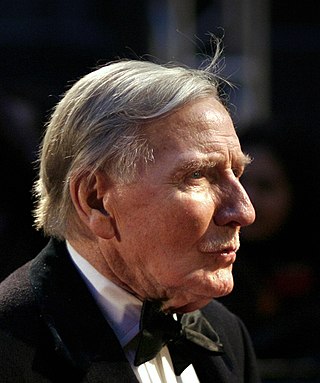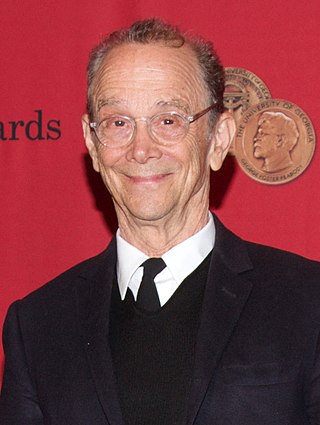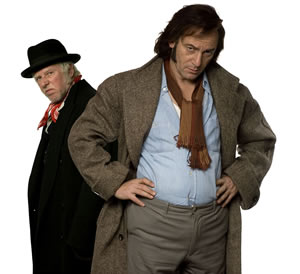Related Research Articles

Leslie Samuel Phillips was an English actor, director, producer and author. He achieved prominence in the 1950s, playing smooth, upper-class comic roles utilising his "Ding dong" and "Hello" catchphrases. He appeared in the Carry On and Doctor in the House film series as well as the long-running BBC radio comedy series The Navy Lark. In his later career, Phillips took on dramatic parts including a BAFTA-nominated role alongside Peter O'Toole in Venus (2006). He provided the voice of the Sorting Hat in several of the Harry Potter films.
The British Academy Film Awards, more commonly known as the BAFTA Film Awards is an annual award show hosted by the British Academy of Film and Television Arts (BAFTA) to honour the best British and international contributions to film. The ceremonies were initially held at the flagship Odeon cinema in Leicester Square in London, before being held at the Royal Opera House from 2007 to 2016. Since 2017, the ceremony has been held at the Royal Albert Hall in London. The statue awarded to recipients depicts a theatrical mask.

Ray Galton OBE and Alan Simpson OBE were English comedy scriptwriters whose partnership lasted over 50 years. They met in 1948 whilst recuperating from tuberculosis at the Milford Sanatorium, near Godalming in Surrey. They are best known for their work with comedian Tony Hancock on radio and television between 1954 and 1961 and their long-running television situation comedy, Steptoe and Son, eight series of which were aired between 1962 and 1974.

Raymond Percy Galton was an English radio and television scriptwriter, best known for the Galton and Simpson comedy writing partnership with Alan Simpson. Together they devised and wrote 1950s and 60s BBC sitcoms including Hancock's Half Hour (1954–1961), the first two series' of Comedy Playhouse (1961–1963), and Steptoe and Son (1962–1974).

Joel Grey is an American actor, singer, dancer, photographer and theatre director. He is best known for portraying the Master of Ceremonies in the musical Cabaret on Broadway as well as in the 1972 film adaptation. He has won an Academy Award, a Tony Award, and a Golden Globe Award.

The National Institute of Dramatic Art (NIDA) is an Australian educational institution for the performing arts is based in Sydney, New South Wales. Founded in 1958, many of Australia's leading actors and directors trained at NIDA, including Cate Blanchett, Mel Gibson, Judy Davis and Baz Luhrmann.

Sarah Caroline Sinclair, known professionally as Olivia Colman, is an English actress. Known for her comedic and dramatic roles in film and television, she has received various accolades, including an Academy Award, a British Academy Film Award, two Emmy Awards, three British Academy Television Awards and three Golden Globe Awards.
World Productions is a British television production company, founded on 20 March 1990 by acclaimed producer Tony Garnett, and owned by ITV plc following a takeover in 2017.
The BAFTA TV Awards, or British Academy Television Awards are presented in an annual award show hosted by the BAFTA. They have been awarded annually since 1955.
The 1958 Guild of Television Producers and Directors Awards were the fourth annual giving of the awards which later became known as the British Academy Television Awards. This year saw the expansion of the Awards from their initial four categories to seven. It was the final occasion upon which the Awards were given by the Guild, as the following year the organisation merged with the British Film Academy to form the Society of Film and Television Arts.
The 1959 Society of Film and Television Arts Television Awards were the first giving under that name of the United Kingdom's premier television awards, having previously been known as the Guild of Television Producers and Directors Awards before that organisation's merger with the British Film Academy. The awards later became known as the British Academy Television Awards, under which name they are still given.
The 1961 Society of Film and Television Arts Television Awards, the United Kingdom's premier television awards ceremony. The awards later became known as the British Academy Television Awards, under which name they are still given.
The 1962 Society of Film and Television Arts Television Awards, the United Kingdom's premier television awards ceremony. The awards later became known as the British Academy Television Awards, under which name they are still given.

BAFTA Cymru is the Welsh branch of the British Academy of Film and Television Arts (BAFTA) and was founded in 1987.

Peter Kosminsky is a British writer, director and producer. He has directed Hollywood movies such as White Oleander and television films like Warriors, The Government Inspector, The Promise, Wolf Hall and The State.

The Curse of Steptoe is a television play which was first broadcast on 19 March 2008 on BBC Four as part of a season of dramas about television personalities. It stars Jason Isaacs as Harry H. Corbett and Phil Davis as Wilfrid Brambell. The drama centres on the actors' on- and off-screen relationship during the making of the BBC sitcom Steptoe and Son, and is based on interviews with colleagues, friends and family of the actors, and the Steptoe writers, Ray Galton and Alan Simpson.
The British Academy Scotland Awards are presented annually at an awards ceremony organised by BAFTA Scotland.
Argonon is an independent media group founded in 2011 by James Burstall, the CEO of Leopard Films. Argonon has offices in London, Los Angeles, New York, Liverpool, Oklahoma, and Glasgow. The group produces and distributes factual entertainment, documentary, reality, entertainment, arts, drama, and children's programming for various television networks and channels worldwide, although they focus on the UK, US, and Canadian markets. Argonon produces shows such as The Masked Singer UK (ITV), Worzel Gummidge, Dispatches, Attenborough and the Mammoth Graveyard, House Hunters International (HGTV) and Hard Cell (Netflix).
The Triple Crown of Acting is a term used in the American entertainment industry to describe actors who have won a competitive Academy Award, Emmy Award, and Tony Award in the acting categories, the highest accolades recognized in American film, television, and theater, respectively. Its term is related to other competitive areas, such as the Triple Crown of horse racing.
The 1963 Society of Film and Television Arts Television Awards, the United Kingdom's premier television awards ceremony. The awards later became known as the British Academy Television Awards, under which name they are still given.
References
- ↑ "Television Actor in 1960". bafta.org. BAFTA. Retrieved 15 September 2016.
- ↑ "Television Actress in 1960". bafta.org. BAFTA. Retrieved 15 September 2016.
- ↑ "Television Designer in 1960". bafta.org. BAFTA. Retrieved 15 September 2016.
- ↑ "Television Drama Production in 1960". bafta.org. BAFTA. Retrieved 15 September 2016.
- ↑ "Television Factual in 1960". bafta.org. BAFTA. Retrieved 15 September 2016.
- ↑ "Television Light Entertainment Artist in 1960". bafta.org. BAFTA. Retrieved 15 September 2016.
- ↑ "Television Light Entertainment in 1960". bafta.org. BAFTA. Retrieved 15 September 2016.